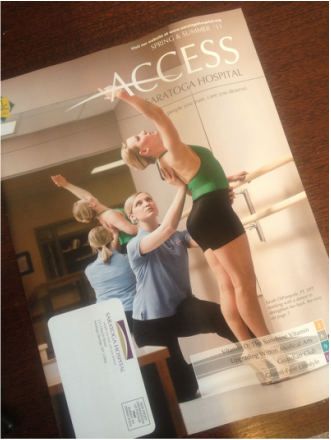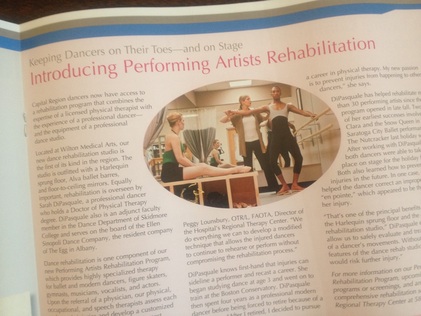
Oh yeah....and the pics are from a magazine for Saratoga Hospital which was celebrating it's new Performing Arts Rehabilitation Program. I was delighted to pose with my friend/Physical Therapist, Sarah DiPasquale, who was a former dancer with the Ellen Sinopoli Dance Company and played a huge roll in pioneering the program!
Tip 1: Knowledge is power
If you have breezed through your early training with little to no injuries, then even a minor injury can seem overwhelming and even career ending. For some, myself included, the first instinct is avoidance. This is not the best solution. Whatever your issue is, avoiding answers is in no way helpful. If anything, your injury will progress and then will take longer to heal or even worse, in the process of compensating for your injury you may get another one.
Tip 2: Find Doctors you like working with
From your PCP to your Physical Therapist, make sure you find someone you like and are comfortable with. Not always being the most outspoken person, I am a stickler for this. Make sure you have someone who understands what you do as a dancer, or at least wants to learn. I have had some wonderful doctors who have known the importance of getting back to work safely and in a timely fashion. If you end up with someone who does not understand this, or wants to dismiss you with no solution, I recommend finding someone else.

If you are a novice in navigating the medical field, know that your doctors are specialist in THEIR fields. Orthopedics are masters of surgery. If your x-ray comes up clear (aka you don't need surgery), but you know something is wrong, don't be afraid to ask for a script for Physical Therapy.
Tip 4: You may have to lie
As dancers we are use to being tough and pride ourselves on our high pain tolerance. We are use to pushing our pain aside and have the ability to ignore it's existence. When you are sitting across from your doctor it is NOT the time to do this. If anything, when they ask you your pain level on a scale from 1-10 it doesn't hurt to exaggerate, just a little...shhhhhh. It is best to be as descriptive as possible. Prior to an appointment it's a good idea to be extra observant and maybe even write down what you notice so that you don't forget once you are in the office.
 RSS Feed
RSS Feed
